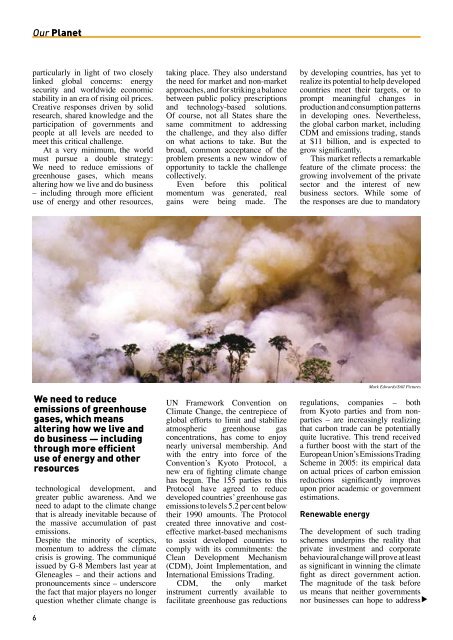UNEP Magazine "Climate change and economic development"
UNEP Magazine "Climate change and economic development"
UNEP Magazine "Climate change and economic development"
Create successful ePaper yourself
Turn your PDF publications into a flip-book with our unique Google optimized e-Paper software.
Our Planet<br />
particularly in light of two closely<br />
linked global concerns: energy<br />
security <strong>and</strong> worldwide <strong>economic</strong><br />
stability in an era of rising oil prices.<br />
Creative responses driven by solid<br />
research, shared knowledge <strong>and</strong> the<br />
participation of governments <strong>and</strong><br />
people at all levels are needed to<br />
meet this critical challenge.<br />
At a very minimum, the world<br />
must pursue a double strategy:<br />
We need to reduce emissions of<br />
greenhouse gases, which means<br />
altering how we live <strong>and</strong> do business<br />
– including through more efficient<br />
use of energy <strong>and</strong> other resources,<br />
taking place. They also underst<strong>and</strong><br />
the need for market <strong>and</strong> non-market<br />
approaches, <strong>and</strong> for striking a balance<br />
between public policy prescriptions<br />
<strong>and</strong> technology-based solutions.<br />
Of course, not all States share the<br />
same commitment to addressing<br />
the challenge, <strong>and</strong> they also differ<br />
on what actions to take. But the<br />
broad, common acceptance of the<br />
problem presents a new window of<br />
opportunity to tackle the challenge<br />
collectively.<br />
Even before this political<br />
momentum was generated, real<br />
gains were being made. The<br />
by developing countries, has yet to<br />
realize its potential to help developed<br />
countries meet their targets, or to<br />
prompt meaningful <strong>change</strong>s in<br />
production <strong>and</strong> consumption patterns<br />
in developing ones. Nevertheless,<br />
the global carbon market, including<br />
CDM <strong>and</strong> emissions trading, st<strong>and</strong>s<br />
at $11 billion, <strong>and</strong> is expected to<br />
grow significantly.<br />
This market reflects a remarkable<br />
feature of the climate process: the<br />
growing involvement of the private<br />
sector <strong>and</strong> the interest of new<br />
business sectors. While some of<br />
the responses are due to m<strong>and</strong>atory<br />
We need to reduce<br />
emissions of greenhouse<br />
gases, which means<br />
altering how we live <strong>and</strong><br />
do business — including<br />
through more efficient<br />
use of energy <strong>and</strong> other<br />
resources<br />
technological development, <strong>and</strong><br />
greater public awareness. And we<br />
need to adapt to the climate <strong>change</strong><br />
that is already inevitable because of<br />
the massive accumulation of past<br />
emissions.<br />
Despite the minority of sceptics,<br />
momentum to address the climate<br />
crisis is growing. The communiqué<br />
issued by G-8 Members last year at<br />
Gleneagles – <strong>and</strong> their actions <strong>and</strong><br />
pronouncements since – underscore<br />
the fact that major players no longer<br />
question whether climate <strong>change</strong> is<br />
UN Framework Convention on<br />
<strong>Climate</strong> Change, the centrepiece of<br />
global efforts to limit <strong>and</strong> stabilize<br />
atmospheric greenhouse gas<br />
concentrations, has come to enjoy<br />
nearly universal membership. And<br />
with the entry into force of the<br />
Convention’s Kyoto Protocol, a<br />
new era of fighting climate <strong>change</strong><br />
has begun. The 155 parties to this<br />
Protocol have agreed to reduce<br />
developed countries’ greenhouse gas<br />
emissions to levels 5.2 per cent below<br />
their 1990 amounts. The Protocol<br />
created three innovative <strong>and</strong> costeffective<br />
market-based mechanisms<br />
to assist developed countries to<br />
comply with its commitments: the<br />
Clean Development Mechanism<br />
(CDM), Joint Implementation, <strong>and</strong><br />
International Emissions Trading.<br />
CDM, the only market<br />
instrument currently available to<br />
facilitate greenhouse gas reductions<br />
Mark Edwards/Still Pictures<br />
regulations, companies – both<br />
from Kyoto parties <strong>and</strong> from nonparties<br />
– are increasingly realizing<br />
that carbon trade can be potentially<br />
quite lucrative. This trend received<br />
a further boost with the start of the<br />
European Union’s Emissions Trading<br />
Scheme in 2005: its empirical data<br />
on actual prices of carbon emission<br />
reductions significantly improves<br />
upon prior academic or government<br />
estimations.<br />
Renewable energy<br />
The development of such trading<br />
schemes underpins the reality that<br />
private investment <strong>and</strong> corporate<br />
behavioural <strong>change</strong> will prove at least<br />
as significant in winning the climate<br />
fight as direct government action.<br />
The magnitude of the task before<br />
us means that neither governments<br />
nor businesses can hope to address<br />
▲

















